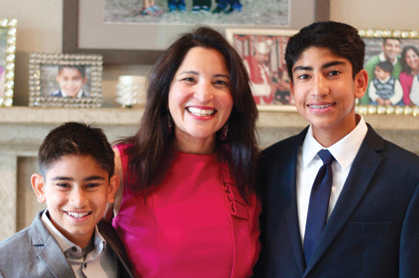
The Permanente Medical Group
San Rafael, CA
WashU Nephrology Fellow, 2002-2005
Sharina Belani, MD, says that her time as a nephrology fellow at Washington University School of Medicine not only was the “ultimate opportunity” to obtain a wide range of clinical expertise, but also served as a foundation for her to build what she now calls “one of the best jobs” — serving as a Chair of Chiefs in Nephrology for The Permanente Medical Group (TPMG), an integrated care system in Northern California that is one of the largest physician-led medical groups in the United States.
“I started as 100 percent clinical when I first joined the organization in 2005,” she says. “Now, about a third of my role is serving as the nephrology strategy lead for Northern California, which includes inpatient and outpatient nephrology services, subspecialty nephrology services, and kidney trans-plant. We focus on three pillars of care delivery strategy, which is improving overall operational excellence, enhancing the patient care experience, and focusing on opportunities to improve the joy of being physicians in health care. Ultimately, we want to empower our Nephrologists to steward care de-livery and develop operational efficiencies that lower the cost of healthcare. For example, we lead the nation in the incidence and prevalence of peritoneal dialysis and optimally starting dialysis without a hemodialysis catheter. In addition, our Nephrologists partner with our extensive medical group to move upstream to identify early CKD and downstream to provide primary palliative care and advance care planning decisions specific to the life sustaining treatment of dialysis”
With 9,000 physicians representing 70 specialties and subspecialties within the medical group, TPMG has more than 80 nephrologists. In addition to seeing patients with kidney diseases and complications, the team cares for 6,000 dialysis patients annually, and follows 3,000 post-kidney transplant patients each year.
“The fellowship at Washington University gave me an amazing degree of confidence as I started my career because I participated in an extensive variety of clinical opportunities, such as tertiary nephrology care and kidney transplant,” she says. “Along with that, I had great mentors who showed me not only their passion for patient care but also what quality care can look like.”
After graduating from the Feinberg School of Medicine at Northwestern University in Chicago, Dr. Belani came to St. Louis for her residency in internal medicine in 1999, after she and her then fiancé, Jay Belani, both matched at Barnes-Jewish Hospital for residencies (he’s a urologist). “What drew me to nephrology were the initial experiences I had with the attendings, who had passion and drive for renal physiology and were the ‘thinking’ internal medicine experts.”
She still can recall many cases and experiences in the Division of Nephrology, even fifteen years after she moved from St. Louis to San Rafael, Calif. “One of my fondest memories there was on late night rounds with Aubrey Morrison, Will Ross and Stanley Misler,” she says with a laugh. “We would have 30 or 40 hospital patients and then, between 7 and 8 p.m., they would all sit down with a marker and dry erase board and go through each patient in excruciating detail. It actually was quite fun as well as educational!”
And recalling her time with Daniel Brennan in transplant nephrology she says, “The amount of expertise we developed in post-transplant care was so profound that I only realized later how unique and special it was. I think that’s why I value that education to such an extent now. It taught me the many roles of a physician — caregiver, researcher, and as leader in advocating for the very best in-patient care.”
Being part of an integrated health-care system allows Dr. Belani to use large-scale data that can then help physicians identify patients at high risk for diseases. “Once we see those who have the highest risk, we can educate the patients and primary physicians and implement interventions to slow down or minimize progression of disease.”
When she’s not at the office, Dr. Belani and her husband, who have two children ages 13 and 15, spend much of their leisure time being active, whether it’s hiking, skiing, or being on the water near their home.
